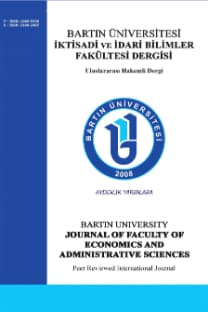Bartın Üniversitesi Yönetim Bilişim Sistemleri Bölümü Lisansüstü Derslerinin Ders İçeriklerinin Endüstri 4.0 İle Uyumunun İncelenmesi
Öz İlk olarak Almanya’da ortaya çıkan ve son yıllarda Türkiye’de de gerek iş dünyasının, gerekse akademinin oldukça ilgisini çeken Endüstri 4.0 kavramı ve uygulamalarının günlük hayatta ve üretim süreçlerinde kullanılmasının gün geçtikçe artması beklenmektedir. İçeriği ve içerdiği fonksiyonlar bağlamında üretim sürecine oldukça yakın olan Yönetim Bilişim Sistemleri(YBS) alanının da bu yeni sanayi devriminin tam ortasında olması gerekmektedir. Bu çalışmada, Bartın Üniversirtesi Yönetim Bilişim Sistemleri Anabilim Dalı lisansüstü programında verilmekte olan derslerin Endüstri 4.0 ile ilişkisi ortaya konmuştur. İki aşamalı inceleme sürecinin sonucunda, Endüstri 4.0’ın temel unsurlarına verilmekte olan Yönetim Bilişim Sistemleri lisansüstü eğitim programında yeterli derecede yer verilmediği görülmüştür.
Anahtar Kelimeler:
Endüstri 4.0, Yönetim Bilişim Sistemleri, , Ders İçerikleri
___
- Arı, E., Kocatepe, İ., & Özköse, H. (2016). A Broad Analysis of Virtual Reality Applications. Global Conference on Applied Computing in Science and Engineering. Roma: Science Know.
- Atzori, L., Iera, A., & Morabito, G. (2010). The Internet of Things: A survey. Computer Networks, 54(15), 2787-2805.
- Blanchett, M., Rinn, T., von Thaden, G., & de Thieulloy, G. (2014). Industry 4.0 - The new industrial revolution - How Europe will succeed. Munich: Roland Berger Strategy Consultants. https://www.rolandberger.com/publications/publication_pdf/roland_berger_tab_industry_4_0_20140403.pdf adresinden alındı
- Davies, R. (2015). Industry 4.0 - Digitalisation for productivity and growth. European Parliament.
- Ege Bölgesi Sanayi Odası. (2015). Sanayi 4.0 - Uyum Sağlayamayan Kaybedecek. İzmir: Ege Bölgesi Sanayi Odası.
- Gantz, J., & Reinsel, D. (2011). Extracting Value from Chaos. IDC - Analyze the Future, 1-12.
- Gehrke, L., Kühn, A., Rule, D., Moore, P., Bellmann, C., Siemens, S., . . . Standley, M. (2015). Industry 4.0 - A Discussion of Qualifications and Skills in the Factory of the Future: A German and American Perspective. Düsseldorf: VDI-Haus .
- Ghafory, I. (2016). Siber Fiziksel Sistemler. (4FLYY) 6 4, 2017 tarihinde Endüstri 4.0: http://www.endustri40.com/siber-fiziksel-sistemler/ adresinden alındı
- Hofmann, E., & Rüsch, M. (2017). Industry 4.0 and the current status as well as future prospects on logistics. Computers in Industry(89), s. 23-34.
- Koç Sistem. (2016). Akıllı Üretim. (Koç Sistem) 6 4, 2017 tarihinde NOW - New Opportunities World. adresinden alındı
- Lasi, H., Kemper, H.-G., Fettke, P., Feld, T., & Hoffmann, M. (2014). Industry 4.0. Business & Information Systems Engineering, 6(4), 239-242.
- Lu, Y. (2017). Industry 4.0: A survey on technologies, applications and open research issues. Journal of Industrial Information Integration, 1-40.
- Magruk, A. (2016). Uncertainity in the Sphere of the Industry 4.0 - Potential Areas to Research. Business, Management and Education, 14(2), 275-291.
- Mittermair, M. (2015, March). Industry 4.0 Initiatives. SMT, s. 58-63.
- National Institute of Standards and Technology. (2010, 11). NIST Cloud Computing Program - NCCP. (NIST) 6 4, 2017 tarihinde https://www.nist.gov/programs-projects/nist-cloud-computing-program-nccp adresinden alındı
- Özköse, H., Arı, E., & Gencer, C. (2015). Yesterday, Today and Tomorrow of Big Data. Procedia - Social and Behavioral Sciences, 195, 1042-1050.
- Saunders College of Business. (2017). What is MIS? (Rochester Institute of Technology) 6 3, 2017 tarihinde http://saunders.rit.edu/programs/undergraduate/mis/what-is.php adresinden alındıSun, B., Li, X., Wan, B., Wang, C., Zhou, X., & Chen, X. (2016). Definitions of predictability for Cyber Physical Systems. Journal of Systems Architecture(63), 48-60.
- Yazıcı, A. (2016, Aralık). Endüstri 4.0 ve Otonom Robotlar. Elektrik Mühendisliği(459).
- ISSN: 1309-954X
- Yayın Aralığı: Yılda 2 Sayı
- Başlangıç: 2010
- Yayıncı: Bartın Üniversitesi
Sayıdaki Diğer Makaleler
How Demographic Factors Associate with Employees’ Emotional Intelligence?
G-7 Ülkelerinde İhracatın Ekonomik Büyüme Üzerindeki Etkisi: Panel Nedensellik Analizi
6360 Sayılı Kanun’un Mahalleye Dönüşen Birimler Üzerine Etkisi: Antalya İli Örneği
Aykut ÇAVUŞOĞLU, Mustafa LAMBA
Kuru Kayısı Sektöründe Lisanslı Depoculuk Sistemine Geçişin Sektör Üzerinde Oluşturacağı Gelişmeler
Bulanık TOPSIS Yöntemi ile Termal Otel Seçimi: Afyonkarahisar Örneği
Çağrı SÜRÜCÜ, Hasan YAVUZ, Ahmet ÖZTEL
Türk Bankaları İflas Riskliliklerinin Gri İlişkiler Analizi ile Değerlendirilmesi
Figen TOPRAKDELEN, Mehmet PEKKAYA
Kamu Diplomasisi Bağlamında Barış Pınarı Harekatı
